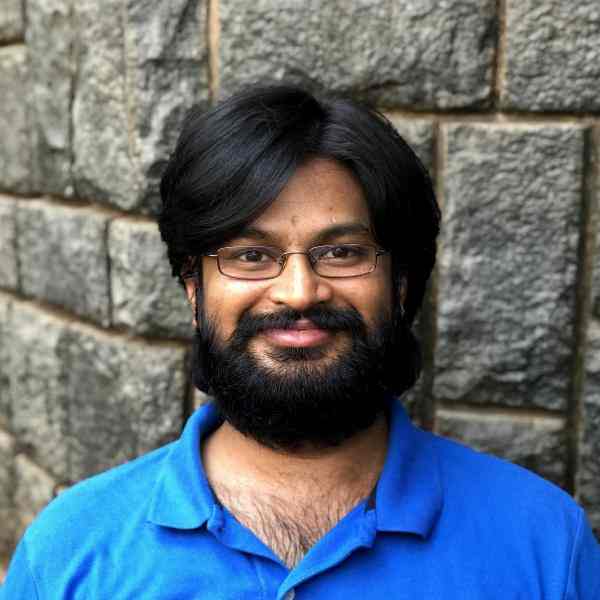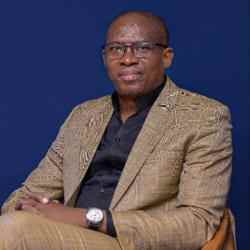Moje téma
Bharath is creating tools and methods to allow different stakeholders to discuss, collaborate, disagree and function together on creating relevant and usable policy.
Co chci změnit
Bharath believes that to create policies that are relevant to the lives of people affected by them, and responsive to evolving needs, we need an informed dialogue between policymakers, citizens, and other actors, such as academia, industry, and civil society. In order to facilitate informed dialogue between different actors, he uses tools, such as games, simulations, and role-play exercises. These tools, such as games and simulations, help bring experiences of marginalised communities into the policy dialogue.
A ‘field of view’ refers to what is visible to a person. Bharath and his organization ‘Fields of View’ design tools that help stakeholders stand in each other’s shoes and enable them to see different perspectives, and as a result, act differently. City planners can understand and incorporate the needs of marginalised and vulnerable communities, such as communities living in slums, into the city planning process using these tools. Regional planners can prepare better for disaster management by developing better coordination mechanisms between different departments using these tools. In planning for the country’s energy future, these tools help different departments come together and understand each other’s roles and limitations (such as budgets) and collaborate in re-aligning them. These tools not only provide planners new inputs, but also push them to ask questions such as “How can we recast the role of planning based on understanding of the real needs of the citizens?” Citizens and civil society organisations can better understand decisions of policymakers using these tools, and develop more informed advocacy strategies.
Bharath is essentially creating a new method to create inclusive policy by embedding these tools into the system. This new method also serves a pedagogical purpose, as it can equip future policymakers to create inclusive policy.
Kde vidím problém
In India’s diverse democracy, the rhetoric about the government not doing its job is extremely common. The design and implementation of policy does not reflect the needs of all citizens, especially the marginalized and vulnerable communities, and the trade-offs therein – who is served, who is not, and the effects of that on the system as a whole. For example, a new city transit system is built that involves a road that is signal-free for cars to pass fast, but most citizens who use the bus cannot use that road, as it has no bus stops. Poor and marginalized communities are the least represented and often the most affected by decisions about basic city functions as education, transport, housing, or energy. Meaningful participation of citizens is also hampered by the lack of understanding and awareness; many citizens are not aware of how policies that affect them are made, and do not have access to relevant information.
The government depends upon the data and analysis available to it to make decisions. Data is often produced by academic or other experts, and can thus be biased or otherwise limited by the point of view represented by the source. The intangibles that reflect diverse and sometimes conflicting citizen preferences remain hidden from the problem statements that governments rely on to draft laws and policies. Where tools for creation and review of policy are ineffective, redundant, inefficient, and non-inclusive, these detrimental patterns persist and citizens lose trust in the governance processes. As change accelerates and population pressure increases, the need for more flexible and inclusive patterns of interaction between citizens and decision-makers becomes more and more crucial.
Jak to změním
Through his organization, Fields of View, Bharath operates along three strategic lines: a policy lab, school of policy, and the making policy accessible initiative.
Every Fields of View project taken up in the policy lab is done in partnership with either a government or a civil society organization or both. Bharath uses this strategy to ensure that the tools they create will be useful in their constituents’ contexts, as the goal is to embed the practice of reusing and updating them. The policy lab connects constituents with each other and enables them to evaluate policies and improve monitoring and feedback, which is part of the government’s mandate. The project Joint Road Forward, for example, aims to better design transport infrastructure in Bangalore, by leveraging different forms of relevant data, and by getting the citizens’ group Bangalore Bus Prayaanikara Vedike (BBVP) to collaborate with the BMTC (Bangalore Metropolitan Transport Corporation) through games and simulations that help both sides negotiate services. The tools developed allow citizen groups to demand better services, while understanding the constraints faced by BMTC. These tools help BMTC plan in a way that they can include the needs and preferences of commuters in their plans. Thus, these tools allow different stakeholders ways of articulating one’s priorities and constraints while also having incentives to ‘try on’ the perspectives of other stakeholders and consider alternatives together. Following Fields’ of View’s work in Bangalore, the Directorate of Urban Land Transport (DULT) has asked Bharath to work on planning for inclusive transportation in Tier-2 and Tier-3 cities. Bharath has a vision that India can become a leader in collaborative reimagining of policies, because its familiarity in coping with competing identities is an opportunity to create exemplars that other countries can use as well.
The second example related to disaster management at both state and national levels illustrates how Fields of View’s games and simulations create a realistic, non-threatening environment that exposes participants to different perspectives and disciplines that generally function in silos. The National Disaster Management Authority has largely borrowed international protocol for communication between agencies during disasters and sophisticated software, which don’t fit local Indian realities and thus are not uniformly followed by all agencies. Therefore, in practice, the agencies revert to inefficient older communication protocols. To address this, Bharath co-created tools with the NDMA to design a game to understand how information actually flows during a disaster, between different disaster management agencies. Outcomes from these games were used by the national Department of Science and Technology to introduce more flexible new protocol that empowered different agencies to collaborate and customize their plan of action based on the events disasters or specific scenarios. Bharath's design criteria are that the tools need to be both scalable and replicable, ensuring that the tools themselves can be used in different contexts.
In the school of policy, Fields of View works with universities and policy training institutes to build a pool of talent that includes current and future designers, planners, and policymakers who can design for social problems in a way that allows for foresight and inclusion. For example, Fields of View in collaboration with UNESCO-MGIEP (Mahatma Gandhi Institute for Peace and Sustainable Development) developed a game on the Inclusive Wealth Index (IWI) for policymakers, in universities worldwide and at executive leadership programs. The game Cantor’s World has been designed for policymakers to experiment with different policy choices and experience first-hand the tug-of-war between short-term results and long-term sustainability. Bharath teaches game design in different institutions, including National Institute of Design, and International Institute of Information Technology, Bangalore. All hisIn order to improve meaningful participation of citizens in the policymaking process, Fields of View undertook the making policy accessible initiative to enable an informed discourse and debate among those who are affected by these policies. Under this initiative, Fields of View is working on a combination of games, videos, comics, and in the future, non-sensational graphic novels. For example, Rubbish! is a tri-lingual board game designed with the team at Hasirudala in Bangalore, who work with waste, to address gaps in knowledge and behaviour among citizens when it comes to the waste eco-system. The game promotes a holistic understanding of the waste management system, and facilitates immersive learning which allow the players to examine and reflect on their choices related to segregation of waste, and the environmental cost of consumption.
Bharath’s work on urban poverty in Bangalore draws from a survey of 27 slums, which he was involved in, to co-design processes to identify priorities and interests of the communities. Bharath’s work on urban poverty challenges and debunks prevalent assumptions about the relationship of slums to the city (such as slums are a drain on the city’s economy) and paves the way for a more informed and evidence-based policy for addressing urban poverty.
So far, Bharath’s organization has been funded by research grants and grants that are payment for services rendered. He is working on creating a robust model for his organization to warrant that they do not work in isolation by ensuring that 50% funding comes from research grants and the remaining 50% comes from an endowment that he is building. This ratio would keep them tuned to needs as they arise and create tools that will be relevant to gaps in governance. Initially, Bharath thought that funding could arise from 4 sectors - the government, CSOs, academia and the industry, and in his experience, he found that the government and CSOs were most open to funding his work because inherently he was helping them be more effective at their jobs. By 2020, Bharath aims at creating tools under an open source license that is the need of the hour for CSOs and governments but they lack funding. He wants to work on building an ecosystem of actors to activate a network that will help address the issues around policy-making, so that stakeholders can leverage each other’s strengths through dialogue. Bharath has worked with 4 different departments of the government of India and 15 CSOs and academic institutions, all across India, Sri Lanka, and the Netherlands.
Kdo jsem
Bharath was brought up in an environment where failure was considered acceptable and taking risks was appreciated, an important aspect of learning that the Indian education system fails to address. His parents considered learning from failure an important life lesson and gave him a blank slate to learn as long as he was enjoying the process. The freedom and Bharath's deep inner motivation and discipline drove him to try him his hand at different activities and create his own learning processes. Play was of a special interest to him from a young age and his fondest childhood memories were playing indoor and outdoor games, ideating with friends to come up with the most effective strategies and counterstrategies, applying principles from one game to another and creating variants of games. His favourite was an indoor game which his grandmother had mastered over years of practise, and he and his cousins would team up against her to strategize their win or at least slow down their defeat.
While he enjoyed art and design, he wanted to get a deeper understanding of sciences and engineering. Bharath has an undergrad and Masters degree in Computer Sciences and Information Technology, from IIIT-B, where he gained his knowledge of complex adaptive systems, agent-based modelling, effects of technology on social and economic development which later helped him crystallize his idea. In college, Bharath started the quizzing and gaming club, with the aim of cultivating a community culture where students could challenge each other, build their knowledge by learning from one another through quizzing and participate as a team in national level quizzing competitions.
Bharath then worked at a Bangalore-based think tank for 2 years, where he realized that policymaking was more about theory building than effective solutions. He co-founded Fields of View, a space to build these bridges between theory and practice. He brought together his lifelong tryst with games and his passion to make relevant policy to create a safe space for policymakers, academia, civil society organizations, and industry to experiment and learn. Fields of View has been created as a non-hierarchical and inter-disciplinary space, and currently has a team of 10 individuals, whose backgrounds ranges from arts, social sciences, technology, and law. The organization’s future is charted out by all team members together during a yearly planning retreat, where both the organizations’ and the individual team members’ goals are discussed and agreed upon, to ensure everyone’s aspirations finds a voice. In resonance with the work at Fields of View that is about creating spaces for informed dialogue, the organization too is built on a culture of curiosity, mutual respect, and openness.




